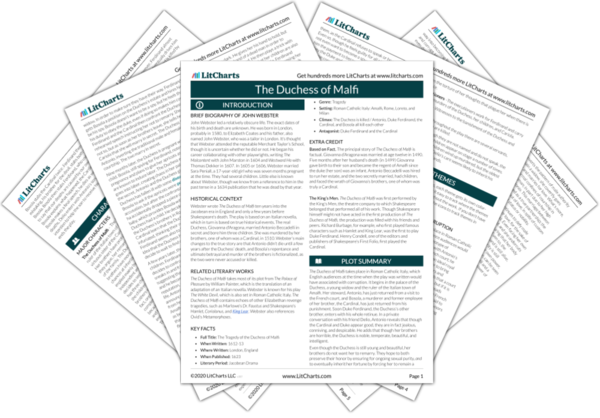Antonio introduces the symbol of poison in the play’s opening while making a political analogy about the ideal government, which, he says, should function like a fountain. Goodness should flow through the country, but if someone poisons the well then death and disease will spread. From this point forward, poisons serve as tools of the corrupt government and become symbols for corruption itself, for hidden threats, and for secrecy. The Cardinal, for example, tells Julia that his secrets are like lingering poisons that would slowly spread through her veins and cause her death. Once she gets the secrets out of him, the Cardinal then kills Julia by making her kiss a literally poisoned book.
Poison Quotes in The Duchess of Malfi
A prince's court
Is like a common fountain, whence should flow
Pure silver drops in general; but if't chance
Some cursed example poison't near the head,
Death and diseases through the whole land spread.
And what is't makes this blessèd government
But a most provident council, who dare freely
Inform him the corruption of the times.

Unlock explanations and citation info for this and every other The Duchess of Malfi quote.
Plus so much more...
Get LitCharts A+This foul melancholy
Will poison all his goodness, for, I'll tell you,
If too immoderate sleep be truly said
To be an inward rust unto the soul,
It then doth follow want of action
Breeds all black malcontents, and their close rearing,
Like moths in cloth, do hurt for want of wearing.
You live in a rank pasture here, i'th' court.
There is a kind of honey-dew that's deadly:
'Twill poison your fame. Look to't. Be not cunning,
For they whose faces do belie their hearts
Are witches ere they arrive at twenty years,
Ay, and give the devil suck.
…
Your darkest actions - nay, your privat'st thoughts –
Will come to light.
It may be that the sudden apprehension
Of danger - for I'll go in mine own shape –
When he shall see it fraught with love and duty,
May draw the poison out of him, and work
A friendly reconcilement. If it fail,
Yet it shall rid me of this infamous calling;
For better fall once than be ever falling.












